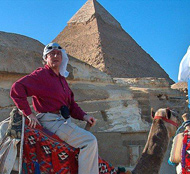
Desmond McGrath
Remembering Mr. Lee Kuan Yew
The best captain an abandoned ship of state ever had and consummate political gardener
By Desmond McGrath
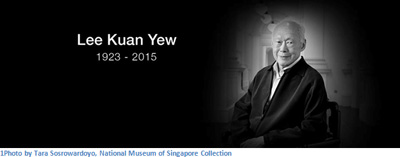
Since arriving in Singapore this past September for my latest project here I had thought of the idea of seeing if I could get an opportunity to interview Mr. Lee for an article or two on Renew America; to that end I had made inquiries to some well-connected friends in Singapore, to see of that could be arranged. Sadly I was far too busy well into the New Year to pursue it with greater vigor, and by the time I returned from Louisiana Mardi Gras season during Chinese New Year, I sadly discovered that Mr. Lee had been hospitalized since Feb 5th and prayed for his recovery as there were always daily updates on his condition on Media Corp's Gold 90.5 FM radio.
The public outpouring of condolences and support from Singaporeans from all walks of life, races and religions has been overwhelming as some thought that he might live forever, remembering one memorable National Day Rally speech in 1988, Mr. Lee declared that Singapore was his life's work, adding half in jest, that "even from my sick bed, even if you are going to lower me into the grave and I feel something is going wrong, I will get up" to alert Singaporeans to any perils he saw ahead. – See more at: Straights Time's "Singapore's founding father Mr. Lee Kuan Yew dies aged 91 at 3.18am on Monday"
I had the good fortune to meet Mr. Lee on two occasions; At the first meeting, as many of my compatriots do, introduced myself as a "Newfoundlander," rather than a "Canadian" and Mr. Lee smiled and responded "I remember the hotly contested debates about Newfoundland's political future some weekends when I was studying in Cambridge, there were several Newfoundlanders there and a couple of others who were on Rhodes Scholarships would show up from other colleges and discuss the Newfoundland Debates (1946-1948 National Convention Debates). It was of great interest to me at the time as Newfoundland, being an island colony, was heading on a path I believed that Singapore must take."
I was incredibly impressed with his knowledge of Newfoundland's history, in particular Newfoundland's participation in the First World War and subsequent debt crisis that lead to the loss of self-government. One of his associates, a bit concerned about the length of time our conversation was taking, was gently encouraging him to move on, but he, in his respectful but commanding way acknowledged him with a nod and hand gesture as we spoke for another minute or so. He asked me what I was doing in Singapore and I smiled replying "I am an engineer, photographer, writer and poet still searching for my inner adult in the world" to which with a twinkle in his eye a smiling chuckle, that anyone who ever met him would remember well and said "I'm a gardener at heart still looking for new ideas to plant in Singapore" as he bade me farewell, much to his associates relief.
I had not realized that Mr. Lee was going to at the event I was attending the second time I met him and when he came through the crowd, he recognized me from a few steps away and came to me briefly saying "hello Mr. Desmond." When he noticed my disbelief that he had remembered my name he smiled and repeated "Mr. Desmond, the boy from Newfoundland who is still discovering the world," with a humble twinkle of great intellect in his eyes, and ever present smile, albeit saddened from the loss of his beloved Madam Kwa Geok Choo the year before, he asked where I was living now and I replied in the Louisiana in the southern USA. His reply was "they are still having a rough time economically but they will come back, it is the America that came back from Pearl Harbor"; we talked for a few minutes more about the Singapore Economy before bidding me farewell again. As a side note, the Singaporean economy had grown 15% the previous year, 2010 while the USA was still struggling; see my article written just a few months prior to meeting Mr. Lee the second time in 2011 here.
Like so many of his generation he was born in a time of great promise and opportunity the roaring twenties, in a world weary from World War One, the last of the Clipper ships about which Joseph Conrad made his stock and trade were still plying the Singapore Straight, the causeway to Johor was just completed just scant months after Radio Singapura, the first local radio service, was launched on 5 May 1923 and Somerset Maugham made his three trips to Singapore between 1921 and 1925 and writing in The Casuarina Tree –
"The Malays, though natives of the soil, dwell uneasily in the towns, and are few. It is the Chinese, supple, alert, and industrious, who throng the streets; the dark-skinned Tamils walk on their silent, naked feet, as though they were but brief sojourners in a strange land... and the English in their topees and white ducks, speeding past in motor-cars or at leisure in their rickshaws, wear a nonchalant and careless air."
The 'nonchalant and careless air' was ragged and worn by the time the great depression had eradicated Mr. Lees Family's previous wealth and opportunities of the roaring 20's, he had few toys and often played with sons of Malay and Chinese fishermen, but excelled in school highest in all of Singapore and Malaya. The 'nonchalant and careless air' devastated by the time Sir Winston Churchill announced that Fortress Singapore has Fallen; the Connaught battery's guns rifling worn smooth by the incessant and futile bombardment trying to push back the hordes of seasoned and ruthless Japanese jungle fighters arriving on stolen bicycles with no real artillery support, but with superior naval air power. While Pearl Harbor was a surprise attack two hours after the march to Singapore started and was well known by the inept British command following the loss of the British Royal Navy battleship HMS Prince of Wales and battlecruiser HMS Repulse; the subsequent loss of Singapore is the greatest and most embarrassing defeat the history of the British Army, worse than Dunkirk. It would not be until decades later that it would be discovered that it was the British that actually gave Japan the technology for naval air superiority around the time of Mr. Lee's birth and were further aided by British spies Sempill and Rutland.
A pamphlet issued to all Japanese soldiers marching on Singapore stated:
"When you encounter the enemy after landing, think of yourself as an avenger coming face to face at last with his father's murderer. Here is a man whose death will lighten your heart."
At the Alexandra Military Hospital, Japanese soldiers murdered the patients they found there, of the 130,000 men captured 9000 died building the Burma-Thailand railway memorialized by the movie "The bridge on the River Kwai" more recently the documentaries "Moving half a mountain" and the movie "The Railway Man". Upwards of 50,000 Singaporeans were murdered some of the shallow graves thereof were discovered in 1962, some next to his son and now Prime Minister, Lee Hsien Loong's school when he was 10 years old.
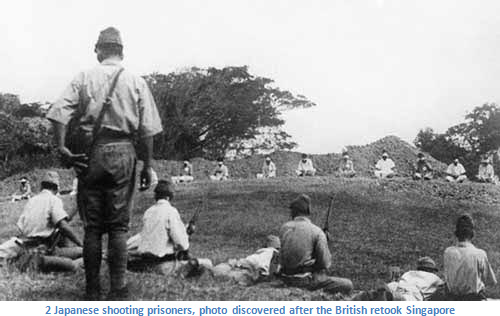
It was against this backdrop that the 19 year old Lee Kuan Yew not only saw his hopes of studying law at Cambridge dashed but to fear for his life, that of his family and then secret love Madam Kwa Geok Choo. One can only imagine the mental toughness forged in that trial by fire through his "First-Hand Experience of the Conquerors Brutality"
During the Japanese occupation, Lee Kuan Yew learnt Japanese and first worked as a clerk in his grandfather's friend's company – a textile importer called Shimoda. Lee then found work transcribing Allied wire reports for the Japanese where he listened to Allied radio stations and wrote down what they were reporting in the Hodobu office (ˆóµÀ²¿ – a Japanese propaganda department). Towards the end of the war, by listening to Allied radio stations, he realised the Japanese were going to lose, and fearing that a brutal war would break out in Singapore as the Japanese made their last stand, he made plans to purchase and move to a farm on the Cameron Highlands with his family. However, a liftboy in his office told him his file had been taken out by the security department, and he realised he was being followed by Japanese security personnel (which continued for three months), so he abandoned those plans as he knew that if he went ahead, he would be in trouble. Lee also ran his own businesses during the war to survive, among which, he manufactured stationery glue under his own brand called 'Stikfas.'
During the occupation, Lee was asked by a Japanese guard to join a group of segregated Chinese men. Sensing that something was amiss, he asked for permission to go back home to collect his clothes first, and the Japanese guard agreed. It turned out that those who were segregated were taken to the beach to be shot as part of the Sook Ching massacre in Singapore.
Source: Lee Kuan Yew The Man And His Ideas (1998). Singapore: Times Edition.
It was with these wartime experiences fresh in his mind that Mr. Lee eventually made his way to post war Cambridge, followed shortly thereafter by his love Madam Kwa Geok Choo where they were later secretly married. 'Without her, I would be a different man': Mr. Lee Kuan Yew's love affair. Mr. Lee was called to the English Bar in June 1950 by the Honourable Society of the Middle Temple and returned to Singapore, with an exemplary scholastic record, open for public purview, to eventually get married publically for the second time. That he escaped Great Britain untainted by the effects of Fabian Socialism in the Cambridge Universities Labour Club; is somewhat of a miracle perhaps he must have seen in them a stealthy version of the same brute force that he saw in the occupying Japanese forces and remembered the mistaken belief before surrender by the British military command in Singapore, that war was still fought by the 'rule book.' It is not known if he ever read Dr. Bella Dodd's School of Darkness, but he certainly recognized communists as a revolutionary and destructive force given the ongoing Korean conflict of the early 1950's, Chin Peng & the Malayan Emergency, Pol Pot and Vietnam:
"Some of the self-proclaimed "knuckle-duster" methods he used to clear obstacles in his path and to counter critics – methods he said he had learnt through life-and-death struggles with communist and communalist opponents who did not believe in Queensberry rules – might be judged by some as harsh. They left even some of his admirers cold. Rightly or wrongly, he always acted in the firm belief that the fledgling nation's cause needed protecting from those whose agendas he was convinced would harm Singapore." Singapore Straits Times
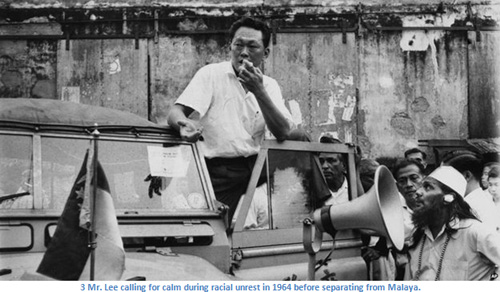
There was no room for the Saul Alinsky's of the world in Mr. Lees Singapore and despite the controversy over Operation Spectrum in 1987 (near the end of the second round of Chin Peng's insurgency in Malaya), there is certainly a high degree of probability that the threat was real; especially if you read all the details about Operation Spectrum and compare notes with Bella Dodd's School of Darkness and look at similar communist activities in the 1950's USA that were exposed by the inappropriately vilified senator Joe McCarthy, called baseless charges and a witch hunt at the time, only to be proven otherwise when documents were released after the Iron Curtain fell. Despite this vehement opposition to the Marxists, socialists and communists, during his career as a Lawyer between 1951 and 1959 prior to becoming Singapore's first Prime Minister he was particularly renowned for his representation of the interests of the trade unions. However later while in Government he did not tolerate strikes and threats by Unions and would deal harshly with those who threatened his Singapore in the same manner that Ronald Regan dealt with the air traffic controllers.
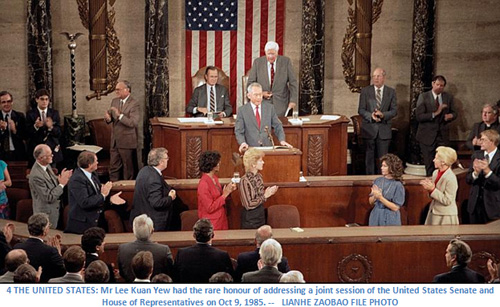
He was a firm believer that there was great honour in the hard work, dedication and apprenticeship of the trades while steadfastly refusing the concept of permanent welfare for those who refused to work or came to Singapore from other countries looking for a handout, he called this concept of welfare without work, the iron rice bowl; He believed that everybody was born with porcelain rice bowl with which to feed themselves as an allegory to a work ethic and if they broke it, it was "your bad luck, if it's yours and it's porcelain you will look after it." This however did not handicap him from helping the working poor get proper housing, sanitation, health care and schooling and it was not done by bullying banks into loaning money to those who refused to work for the benefits they received.
I could not find any reference to him meeting or being influenced by E.F. Schumacher's journey to Burma in 1955 or Fritz's subsequent travels to third world countries, but he always practiced 'Economics as if People Mattered'. He was a staunch believer in meritocracy, a principle upon which America was founded. Each department of government was to be run like a business and public servants were to have compensation comparable to the private sector, public servants who could not deliver were quickly replaced. With his passing he is the Singaporean equivalent of George Washington, Thomas Jefferson, John Adams and Benjamin Franklin all rolled up into one. He was a Lawyer's Lawyer who believed in the sanctity of the letter of the law, that words have a plain meaning and laws were meant to be followed by everyone including those in government. He was a staunch opponent of corruption in all its forms and a "leader who was ruthless in demanding honesty" quote by S. Dhanabalan, former MP and Colleague. He believed that the punishment should fit the crime and Singapore still canes people and remains steadfast on the execution of those smuggling drugs.
He believed in the strength of numbers and that the former Straits Settlement of Singapore and Federated Malaya would stand a better chance of survival together in the turbulent 1960's. Little did he realize that dream would abruptly end after a few short years of racial unrest, issues over redistribution of wealth and accusations of Singapore not paying their fair share, all of it, classic communist agitprop. After Singapore was expelled unanimously by the Malaysian Parliament, 9 August 1965 the tearful Mr. Lee went on national television to explain that Singapore was on its own. While He tried last minute reconciliations before the final vote; afterwards he steadfastly refused to crawl back and beg for reentry.
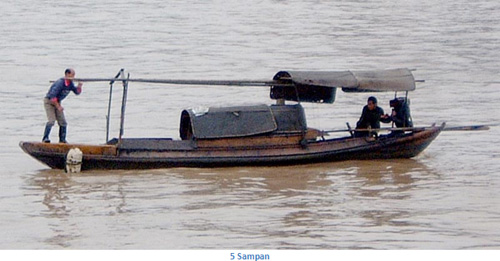
Singapore was cast adrift in the maelstrom of the 1960s, like a rudderless third world sampan of diverse cultures, ethnicities and languages across the Straights of Johor with no natural resources and limited water supply. Singapore was on a similar socio economic footing as the recently independent Kenya and America had just started down the path of the $22 trillion failure of Johnson's Great Society's war on poverty, the American iron rice bowl. Mr. Lee and his crew deftly took the helm of the near foundering ship of state in a manner of leadership that truly ranks with the epic 7,000 km (4,350 mile) voyage of Captain William Bligh from Tonga to East Timor after being set adrift on an open boat following the mutiny on the Bounty, where Bligh's crew lived off fish and captured rainwater for 50 days.
Mr. Lee was at the helm for 31 years and Singapore grew from an overwhelmed Sampan to a sleek and fast China Clipper (despite his sons objections to the contrary calling it a Sampan 2.0), recycling water in a manner that would do the international space station proud. Deftly avoiding the reefs and shoals of the late 20th century, Captain Lee constantly looking beyond the horizon for the socio-economic typhoon's that few others could see. It was a voyage of exploration as well, not unlike Charles Darwin's "Beagle." As the consummate gardener, Mr. Lee encouraged the planting trees and pruning the avenues and byways of Singapore, and traveled the world seeking for seeds of ideas that could germinate and grow in the limited landmass but boundless enthusiasm that was Mr. Lee's Singapore. Before embarking on that voyage he famously quoted: "This country belongs to all of us. We made this country from nothing, from mud-flats... Over 100 years ago, this was a mud-flat, swamp. Today, this is a modern city. Ten years from now, this will be a metropolis. Never fear!" Mr. Lee Kuan Yew at a grassroots event in Sembawang in September 1965.
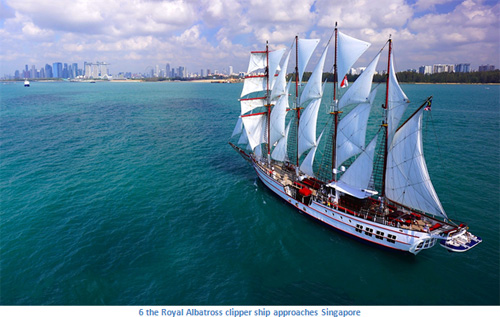
Most of all he was a unifying role model, bringing in a two language policy where English was the common language and all students were required to learn English, and one of three mother tongues in integrated schools; likewise religious tolerance while always a mainstay of Singaporean Society was encouraged and promoted. He was not adverse to changing course when the winds of change dictated and did so with a forthright honesty and tireless oratory that would have respectively made George Washington and Winston Churchill enviously proud. When he finally relented on allowing two casinos to open in Singapore after a lifetime of vocal opposition to gambling, he did so in an open manner, explaining how the times were changing and not like Governor Edwin Edwards of Louisiana who deceitfully introduced it by renaming it "Gaming."
Sense of time and place was evident when after 31 years he relinquished the helm to a younger captain, Prime Minister Goh Chok Tong, who was amongst the many able prot¨¦g¨¦s who flourished under Mr. Lees watch while Mr. Lee stayed on first as Senior Minister and later Minister Mentor when his oldest son Brigadier-General Lee Hsien Loong became Prime Minister in 12 August 2004. In his latter roles he distanced himself from daily chores of being at the helm and focused on the long term aspects like a seasoned navigator with local knowledge of the shoals, currents and political crosswinds, taking increasing trips abroad, sharing his insight with foreign leaders, his love Madam Kwa Geok Choo by his side, constantly seeking the seeds of new ideas.
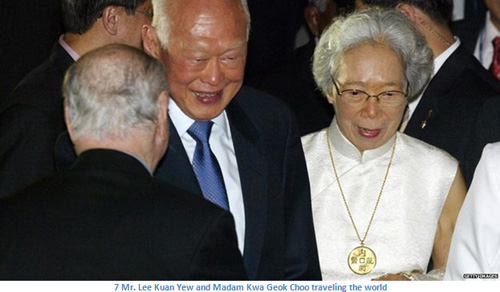
In the garden of his life, his family was cultivated and nurtured with the same care an attention that the weeds and vines of Marxism, socialism and communism were pruned and kept in check. He cultivated many loyal colleagues but few truly close friends as he did not want friendships clouding decisions that must first and foremost should be in the best interest of Singapore and all Singaporeans. Despite the harsh memories of the Japanese brutality in occupied Singapore, he was amongst the first to build a bridge between the two cultures like the bridge that joins the Japanese and Chinese gardens in Singapore, establishing full diplomatic relations with Japan with subsequent embassy in the first year of independence and welcoming Japanese investment. When the 2011 T¨hoku earthquake and tsunami struck, Mr. Lee, still minister mentor, and his son then Prime Minister were quick off the mark with aid and support to Japan.
It is indeed sad that he did not live to see the 50th anniversary celebrations this coming summer, his spirit will live on as the boy who made glue from tapioca under the Japanese Occupation while dreaming of studying law at Cambridge; only to become the leader of an unlikely country that in 50 years rose from third world post-colonial decay, squatters and mudflats to become a first world Asian tiger with a lion at the helm. He placed no blame on the past when independence was thrust upon him 9 August 1965 and dusted himself off as if he had just fallen off his bicycle and remounted, heading with what Madam Kwa Geok Choo called his "great aplomb" down an untrodden path. While there are many who may criticize the path taken by Mr. Lee, and in later years he has always been open in acknowledging his mistakes; however the results speak for themselves if you compare the tale of three countries over the past 50 years, Singapore, Kenya and America.
Singapore and Kenya were on equal footing 50 years ago and America was at the peak of its game, the Marxists socialist and communists still in their infiltration mode like a fungus or cancer, with no Mr. Lee's to root them out or expose them.
Singapore, with no natural resources, now has a highly developed trade-oriented market economy ranked as the most open in the world, 7th least corrupt, most pro-business, with low tax rates, the third highest per-capita GDP in the world, and an unemployment rate of less than 2%, with racial and ethnic strife a dim memory.
Kenya despite the vast areas of fertile agricultural land and abundant natural resources is still post-colonial Kenya with rampant corruption despite reforms initiated in the late 1990's, discrimination and animosities still exists between classes and ethnicities like a post-colonial hangover, with 40% unemployment and 45% of the nation living below the poverty line.
America with boundless natural resources, is well down the Road to Serfdom, the $22 trillion Iron Rice Bowl of the Great Society has been a failure and increasing hordes are walking across the unprotected southern border only to be given free benefits for which they have never contributed. The unemployment rates have been manipulated and are believed to be in the range of 12.6%; including the part time and underemployed individuals it is close to 23%. In less than two terms under a President of Kenyan descent, Americas debt has doubled in an administration that is rife with corruption and scandal, racial tensions have escalated despite the presidents heritage and the United States is well on its way to becoming a North American Kenya.
That's the difference that genuine leadership makes!
Like most Americans who remember where they were when President Kennedy was assassinated; Singaporeans will always remember when Singapore's Father Lee passed away. While I am fortunate to be in Singapore to pay my last respects in person tomorrow and I will never forget the day Father Lee remembered my name.
Desmond McGrath
Reporting from Singapore
© Desmond McGrath
March 27, 2015

Since arriving in Singapore this past September for my latest project here I had thought of the idea of seeing if I could get an opportunity to interview Mr. Lee for an article or two on Renew America; to that end I had made inquiries to some well-connected friends in Singapore, to see of that could be arranged. Sadly I was far too busy well into the New Year to pursue it with greater vigor, and by the time I returned from Louisiana Mardi Gras season during Chinese New Year, I sadly discovered that Mr. Lee had been hospitalized since Feb 5th and prayed for his recovery as there were always daily updates on his condition on Media Corp's Gold 90.5 FM radio.
The public outpouring of condolences and support from Singaporeans from all walks of life, races and religions has been overwhelming as some thought that he might live forever, remembering one memorable National Day Rally speech in 1988, Mr. Lee declared that Singapore was his life's work, adding half in jest, that "even from my sick bed, even if you are going to lower me into the grave and I feel something is going wrong, I will get up" to alert Singaporeans to any perils he saw ahead. – See more at: Straights Time's "Singapore's founding father Mr. Lee Kuan Yew dies aged 91 at 3.18am on Monday"
I had the good fortune to meet Mr. Lee on two occasions; At the first meeting, as many of my compatriots do, introduced myself as a "Newfoundlander," rather than a "Canadian" and Mr. Lee smiled and responded "I remember the hotly contested debates about Newfoundland's political future some weekends when I was studying in Cambridge, there were several Newfoundlanders there and a couple of others who were on Rhodes Scholarships would show up from other colleges and discuss the Newfoundland Debates (1946-1948 National Convention Debates). It was of great interest to me at the time as Newfoundland, being an island colony, was heading on a path I believed that Singapore must take."
I was incredibly impressed with his knowledge of Newfoundland's history, in particular Newfoundland's participation in the First World War and subsequent debt crisis that lead to the loss of self-government. One of his associates, a bit concerned about the length of time our conversation was taking, was gently encouraging him to move on, but he, in his respectful but commanding way acknowledged him with a nod and hand gesture as we spoke for another minute or so. He asked me what I was doing in Singapore and I smiled replying "I am an engineer, photographer, writer and poet still searching for my inner adult in the world" to which with a twinkle in his eye a smiling chuckle, that anyone who ever met him would remember well and said "I'm a gardener at heart still looking for new ideas to plant in Singapore" as he bade me farewell, much to his associates relief.
I had not realized that Mr. Lee was going to at the event I was attending the second time I met him and when he came through the crowd, he recognized me from a few steps away and came to me briefly saying "hello Mr. Desmond." When he noticed my disbelief that he had remembered my name he smiled and repeated "Mr. Desmond, the boy from Newfoundland who is still discovering the world," with a humble twinkle of great intellect in his eyes, and ever present smile, albeit saddened from the loss of his beloved Madam Kwa Geok Choo the year before, he asked where I was living now and I replied in the Louisiana in the southern USA. His reply was "they are still having a rough time economically but they will come back, it is the America that came back from Pearl Harbor"; we talked for a few minutes more about the Singapore Economy before bidding me farewell again. As a side note, the Singaporean economy had grown 15% the previous year, 2010 while the USA was still struggling; see my article written just a few months prior to meeting Mr. Lee the second time in 2011 here.
Like so many of his generation he was born in a time of great promise and opportunity the roaring twenties, in a world weary from World War One, the last of the Clipper ships about which Joseph Conrad made his stock and trade were still plying the Singapore Straight, the causeway to Johor was just completed just scant months after Radio Singapura, the first local radio service, was launched on 5 May 1923 and Somerset Maugham made his three trips to Singapore between 1921 and 1925 and writing in The Casuarina Tree –
"The Malays, though natives of the soil, dwell uneasily in the towns, and are few. It is the Chinese, supple, alert, and industrious, who throng the streets; the dark-skinned Tamils walk on their silent, naked feet, as though they were but brief sojourners in a strange land... and the English in their topees and white ducks, speeding past in motor-cars or at leisure in their rickshaws, wear a nonchalant and careless air."
The 'nonchalant and careless air' was ragged and worn by the time the great depression had eradicated Mr. Lees Family's previous wealth and opportunities of the roaring 20's, he had few toys and often played with sons of Malay and Chinese fishermen, but excelled in school highest in all of Singapore and Malaya. The 'nonchalant and careless air' devastated by the time Sir Winston Churchill announced that Fortress Singapore has Fallen; the Connaught battery's guns rifling worn smooth by the incessant and futile bombardment trying to push back the hordes of seasoned and ruthless Japanese jungle fighters arriving on stolen bicycles with no real artillery support, but with superior naval air power. While Pearl Harbor was a surprise attack two hours after the march to Singapore started and was well known by the inept British command following the loss of the British Royal Navy battleship HMS Prince of Wales and battlecruiser HMS Repulse; the subsequent loss of Singapore is the greatest and most embarrassing defeat the history of the British Army, worse than Dunkirk. It would not be until decades later that it would be discovered that it was the British that actually gave Japan the technology for naval air superiority around the time of Mr. Lee's birth and were further aided by British spies Sempill and Rutland.
A pamphlet issued to all Japanese soldiers marching on Singapore stated:
"When you encounter the enemy after landing, think of yourself as an avenger coming face to face at last with his father's murderer. Here is a man whose death will lighten your heart."
At the Alexandra Military Hospital, Japanese soldiers murdered the patients they found there, of the 130,000 men captured 9000 died building the Burma-Thailand railway memorialized by the movie "The bridge on the River Kwai" more recently the documentaries "Moving half a mountain" and the movie "The Railway Man". Upwards of 50,000 Singaporeans were murdered some of the shallow graves thereof were discovered in 1962, some next to his son and now Prime Minister, Lee Hsien Loong's school when he was 10 years old.

It was against this backdrop that the 19 year old Lee Kuan Yew not only saw his hopes of studying law at Cambridge dashed but to fear for his life, that of his family and then secret love Madam Kwa Geok Choo. One can only imagine the mental toughness forged in that trial by fire through his "First-Hand Experience of the Conquerors Brutality"
During the Japanese occupation, Lee Kuan Yew learnt Japanese and first worked as a clerk in his grandfather's friend's company – a textile importer called Shimoda. Lee then found work transcribing Allied wire reports for the Japanese where he listened to Allied radio stations and wrote down what they were reporting in the Hodobu office (ˆóµÀ²¿ – a Japanese propaganda department). Towards the end of the war, by listening to Allied radio stations, he realised the Japanese were going to lose, and fearing that a brutal war would break out in Singapore as the Japanese made their last stand, he made plans to purchase and move to a farm on the Cameron Highlands with his family. However, a liftboy in his office told him his file had been taken out by the security department, and he realised he was being followed by Japanese security personnel (which continued for three months), so he abandoned those plans as he knew that if he went ahead, he would be in trouble. Lee also ran his own businesses during the war to survive, among which, he manufactured stationery glue under his own brand called 'Stikfas.'
During the occupation, Lee was asked by a Japanese guard to join a group of segregated Chinese men. Sensing that something was amiss, he asked for permission to go back home to collect his clothes first, and the Japanese guard agreed. It turned out that those who were segregated were taken to the beach to be shot as part of the Sook Ching massacre in Singapore.
Source: Lee Kuan Yew The Man And His Ideas (1998). Singapore: Times Edition.
It was with these wartime experiences fresh in his mind that Mr. Lee eventually made his way to post war Cambridge, followed shortly thereafter by his love Madam Kwa Geok Choo where they were later secretly married. 'Without her, I would be a different man': Mr. Lee Kuan Yew's love affair. Mr. Lee was called to the English Bar in June 1950 by the Honourable Society of the Middle Temple and returned to Singapore, with an exemplary scholastic record, open for public purview, to eventually get married publically for the second time. That he escaped Great Britain untainted by the effects of Fabian Socialism in the Cambridge Universities Labour Club; is somewhat of a miracle perhaps he must have seen in them a stealthy version of the same brute force that he saw in the occupying Japanese forces and remembered the mistaken belief before surrender by the British military command in Singapore, that war was still fought by the 'rule book.' It is not known if he ever read Dr. Bella Dodd's School of Darkness, but he certainly recognized communists as a revolutionary and destructive force given the ongoing Korean conflict of the early 1950's, Chin Peng & the Malayan Emergency, Pol Pot and Vietnam:
"Some of the self-proclaimed "knuckle-duster" methods he used to clear obstacles in his path and to counter critics – methods he said he had learnt through life-and-death struggles with communist and communalist opponents who did not believe in Queensberry rules – might be judged by some as harsh. They left even some of his admirers cold. Rightly or wrongly, he always acted in the firm belief that the fledgling nation's cause needed protecting from those whose agendas he was convinced would harm Singapore." Singapore Straits Times

There was no room for the Saul Alinsky's of the world in Mr. Lees Singapore and despite the controversy over Operation Spectrum in 1987 (near the end of the second round of Chin Peng's insurgency in Malaya), there is certainly a high degree of probability that the threat was real; especially if you read all the details about Operation Spectrum and compare notes with Bella Dodd's School of Darkness and look at similar communist activities in the 1950's USA that were exposed by the inappropriately vilified senator Joe McCarthy, called baseless charges and a witch hunt at the time, only to be proven otherwise when documents were released after the Iron Curtain fell. Despite this vehement opposition to the Marxists, socialists and communists, during his career as a Lawyer between 1951 and 1959 prior to becoming Singapore's first Prime Minister he was particularly renowned for his representation of the interests of the trade unions. However later while in Government he did not tolerate strikes and threats by Unions and would deal harshly with those who threatened his Singapore in the same manner that Ronald Regan dealt with the air traffic controllers.

He was a firm believer that there was great honour in the hard work, dedication and apprenticeship of the trades while steadfastly refusing the concept of permanent welfare for those who refused to work or came to Singapore from other countries looking for a handout, he called this concept of welfare without work, the iron rice bowl; He believed that everybody was born with porcelain rice bowl with which to feed themselves as an allegory to a work ethic and if they broke it, it was "your bad luck, if it's yours and it's porcelain you will look after it." This however did not handicap him from helping the working poor get proper housing, sanitation, health care and schooling and it was not done by bullying banks into loaning money to those who refused to work for the benefits they received.
I could not find any reference to him meeting or being influenced by E.F. Schumacher's journey to Burma in 1955 or Fritz's subsequent travels to third world countries, but he always practiced 'Economics as if People Mattered'. He was a staunch believer in meritocracy, a principle upon which America was founded. Each department of government was to be run like a business and public servants were to have compensation comparable to the private sector, public servants who could not deliver were quickly replaced. With his passing he is the Singaporean equivalent of George Washington, Thomas Jefferson, John Adams and Benjamin Franklin all rolled up into one. He was a Lawyer's Lawyer who believed in the sanctity of the letter of the law, that words have a plain meaning and laws were meant to be followed by everyone including those in government. He was a staunch opponent of corruption in all its forms and a "leader who was ruthless in demanding honesty" quote by S. Dhanabalan, former MP and Colleague. He believed that the punishment should fit the crime and Singapore still canes people and remains steadfast on the execution of those smuggling drugs.
He believed in the strength of numbers and that the former Straits Settlement of Singapore and Federated Malaya would stand a better chance of survival together in the turbulent 1960's. Little did he realize that dream would abruptly end after a few short years of racial unrest, issues over redistribution of wealth and accusations of Singapore not paying their fair share, all of it, classic communist agitprop. After Singapore was expelled unanimously by the Malaysian Parliament, 9 August 1965 the tearful Mr. Lee went on national television to explain that Singapore was on its own. While He tried last minute reconciliations before the final vote; afterwards he steadfastly refused to crawl back and beg for reentry.

Singapore was cast adrift in the maelstrom of the 1960s, like a rudderless third world sampan of diverse cultures, ethnicities and languages across the Straights of Johor with no natural resources and limited water supply. Singapore was on a similar socio economic footing as the recently independent Kenya and America had just started down the path of the $22 trillion failure of Johnson's Great Society's war on poverty, the American iron rice bowl. Mr. Lee and his crew deftly took the helm of the near foundering ship of state in a manner of leadership that truly ranks with the epic 7,000 km (4,350 mile) voyage of Captain William Bligh from Tonga to East Timor after being set adrift on an open boat following the mutiny on the Bounty, where Bligh's crew lived off fish and captured rainwater for 50 days.
Mr. Lee was at the helm for 31 years and Singapore grew from an overwhelmed Sampan to a sleek and fast China Clipper (despite his sons objections to the contrary calling it a Sampan 2.0), recycling water in a manner that would do the international space station proud. Deftly avoiding the reefs and shoals of the late 20th century, Captain Lee constantly looking beyond the horizon for the socio-economic typhoon's that few others could see. It was a voyage of exploration as well, not unlike Charles Darwin's "Beagle." As the consummate gardener, Mr. Lee encouraged the planting trees and pruning the avenues and byways of Singapore, and traveled the world seeking for seeds of ideas that could germinate and grow in the limited landmass but boundless enthusiasm that was Mr. Lee's Singapore. Before embarking on that voyage he famously quoted: "This country belongs to all of us. We made this country from nothing, from mud-flats... Over 100 years ago, this was a mud-flat, swamp. Today, this is a modern city. Ten years from now, this will be a metropolis. Never fear!" Mr. Lee Kuan Yew at a grassroots event in Sembawang in September 1965.

Most of all he was a unifying role model, bringing in a two language policy where English was the common language and all students were required to learn English, and one of three mother tongues in integrated schools; likewise religious tolerance while always a mainstay of Singaporean Society was encouraged and promoted. He was not adverse to changing course when the winds of change dictated and did so with a forthright honesty and tireless oratory that would have respectively made George Washington and Winston Churchill enviously proud. When he finally relented on allowing two casinos to open in Singapore after a lifetime of vocal opposition to gambling, he did so in an open manner, explaining how the times were changing and not like Governor Edwin Edwards of Louisiana who deceitfully introduced it by renaming it "Gaming."
Sense of time and place was evident when after 31 years he relinquished the helm to a younger captain, Prime Minister Goh Chok Tong, who was amongst the many able prot¨¦g¨¦s who flourished under Mr. Lees watch while Mr. Lee stayed on first as Senior Minister and later Minister Mentor when his oldest son Brigadier-General Lee Hsien Loong became Prime Minister in 12 August 2004. In his latter roles he distanced himself from daily chores of being at the helm and focused on the long term aspects like a seasoned navigator with local knowledge of the shoals, currents and political crosswinds, taking increasing trips abroad, sharing his insight with foreign leaders, his love Madam Kwa Geok Choo by his side, constantly seeking the seeds of new ideas.

In the garden of his life, his family was cultivated and nurtured with the same care an attention that the weeds and vines of Marxism, socialism and communism were pruned and kept in check. He cultivated many loyal colleagues but few truly close friends as he did not want friendships clouding decisions that must first and foremost should be in the best interest of Singapore and all Singaporeans. Despite the harsh memories of the Japanese brutality in occupied Singapore, he was amongst the first to build a bridge between the two cultures like the bridge that joins the Japanese and Chinese gardens in Singapore, establishing full diplomatic relations with Japan with subsequent embassy in the first year of independence and welcoming Japanese investment. When the 2011 T¨hoku earthquake and tsunami struck, Mr. Lee, still minister mentor, and his son then Prime Minister were quick off the mark with aid and support to Japan.
It is indeed sad that he did not live to see the 50th anniversary celebrations this coming summer, his spirit will live on as the boy who made glue from tapioca under the Japanese Occupation while dreaming of studying law at Cambridge; only to become the leader of an unlikely country that in 50 years rose from third world post-colonial decay, squatters and mudflats to become a first world Asian tiger with a lion at the helm. He placed no blame on the past when independence was thrust upon him 9 August 1965 and dusted himself off as if he had just fallen off his bicycle and remounted, heading with what Madam Kwa Geok Choo called his "great aplomb" down an untrodden path. While there are many who may criticize the path taken by Mr. Lee, and in later years he has always been open in acknowledging his mistakes; however the results speak for themselves if you compare the tale of three countries over the past 50 years, Singapore, Kenya and America.
Singapore and Kenya were on equal footing 50 years ago and America was at the peak of its game, the Marxists socialist and communists still in their infiltration mode like a fungus or cancer, with no Mr. Lee's to root them out or expose them.
Singapore, with no natural resources, now has a highly developed trade-oriented market economy ranked as the most open in the world, 7th least corrupt, most pro-business, with low tax rates, the third highest per-capita GDP in the world, and an unemployment rate of less than 2%, with racial and ethnic strife a dim memory.
Kenya despite the vast areas of fertile agricultural land and abundant natural resources is still post-colonial Kenya with rampant corruption despite reforms initiated in the late 1990's, discrimination and animosities still exists between classes and ethnicities like a post-colonial hangover, with 40% unemployment and 45% of the nation living below the poverty line.
America with boundless natural resources, is well down the Road to Serfdom, the $22 trillion Iron Rice Bowl of the Great Society has been a failure and increasing hordes are walking across the unprotected southern border only to be given free benefits for which they have never contributed. The unemployment rates have been manipulated and are believed to be in the range of 12.6%; including the part time and underemployed individuals it is close to 23%. In less than two terms under a President of Kenyan descent, Americas debt has doubled in an administration that is rife with corruption and scandal, racial tensions have escalated despite the presidents heritage and the United States is well on its way to becoming a North American Kenya.
That's the difference that genuine leadership makes!
Like most Americans who remember where they were when President Kennedy was assassinated; Singaporeans will always remember when Singapore's Father Lee passed away. While I am fortunate to be in Singapore to pay my last respects in person tomorrow and I will never forget the day Father Lee remembered my name.
Desmond McGrath
Reporting from Singapore
© Desmond McGrath
The views expressed by RenewAmerica columnists are their own and do not necessarily reflect the position of RenewAmerica or its affiliates.
(See RenewAmerica's publishing standards.)
















